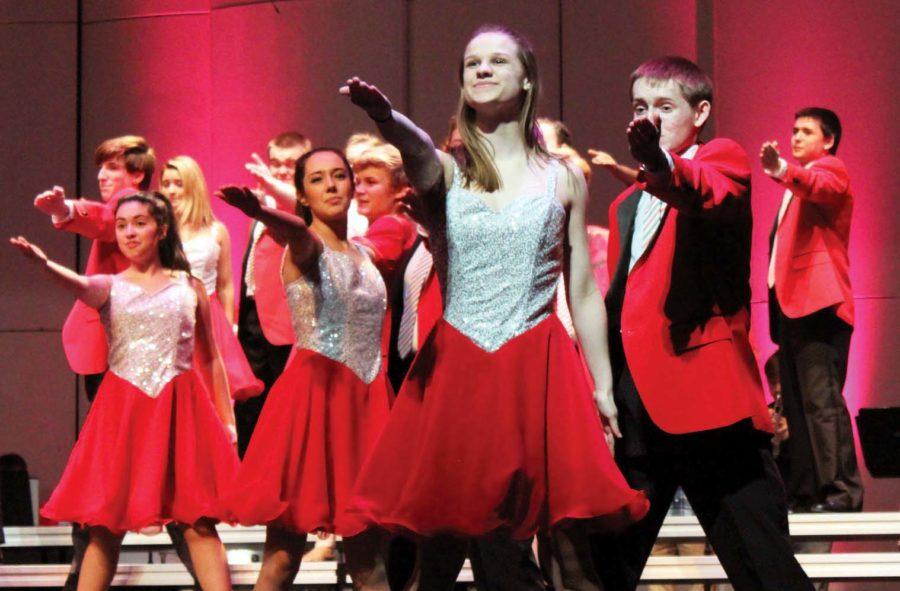As she has done since the beginning of the year, Kathleen Muloma, Ambassadors member and senior, walks into Room P118, a room with platforms and a mirrored wall hidden by a curtain. In this room, the Ambassadors will rehearse until May 2, when they, along with the Accents, will travel to Ben Davis High School for the preliminary round of the Indiana State School Music Association (ISSMA) competition.
This year will be the first time Ambassdors and Accents will compete in the ISSMA competition. According to Kathrine Kouns, Ambassadors and Accents director, both choral groups have had a history of competing in show choir categories; however, for the ISSMA competition, the groups will perform as concert choirs.
 “Concert choir is a little different than show choir because concert choir is more traditional choir. You stand in a group, and you sing, as opposed to what show choir is, the glitzy costumes and the dancing and all of that,” Kouns said. “This is the first year in a really long time (Ambassadors and Accents will be competing in ISSMA)—I have found some plaques and trophies around here from ISSMA from the 1980s, but it’s been a really long time since any of the groups from Carmel’s choir department have been representatives of the school in ISSMA concert choir.”
“Concert choir is a little different than show choir because concert choir is more traditional choir. You stand in a group, and you sing, as opposed to what show choir is, the glitzy costumes and the dancing and all of that,” Kouns said. “This is the first year in a really long time (Ambassadors and Accents will be competing in ISSMA)—I have found some plaques and trophies around here from ISSMA from the 1980s, but it’s been a really long time since any of the groups from Carmel’s choir department have been representatives of the school in ISSMA concert choir.”
Muloma said choral ISSMA has two major components: sight-reading and performance. Sight-reading constitutes 10 percent of the total score; the choirs will be scored on their rhythm, melody and harmony. The performance aspect of ISSMA will include three songs, two from a state-required list and one of choice. These three songs will make up 90 percent of the final score. The top 16 competing schools will qualify for the ISSMA state competition, and among those 16 schools, eight will be ranked in state.
According to Muloma, ISSMA is more challenging because of the added components of sight-reading and the requirement for musical literacy. Normally, the choir will have a song for four to five months where they will have time to break it down.
“There’s an added air of less security just because we haven’t experienced as much other performing arts programs. We just don’t know how things are going to be, and that can affect your confidence. Not knowing is an added stressor,” Muloma said. “You’re judged by tone quality, being able to vary from song to song, intonation obviously, different dynamics and just musicality in general. This is the kind of thing where you have to pay attention to detail. You have to be able know what you’re doing and why you’re doing it.”
Even with sight reading being a challenge, Kouns said the biggest problem is merely inexperience. According to Kouns, other schools have the experience to know exactly how to run the audition.
“It’s just going to be a learning experience, like anything the first time, you kind of can’t tell what it’s going to be until after you do it. It’s like explaining to someone what it feels like to ride a roller coaster, well ‘you just got to get on it,’” she said.
Muloma also looks to the ISSMA competition to improve the Ambassadors’s technical skills.
“I am so excited. I love the classical sound. I love the harmonies—which we can’t do as much for show choir. I love the choices we have (for ISSMA). I love seeing the peoples’ faces when we nail a sight-reading section we just got, or when we get a really hard harmony or dynamics,” Muloma said. “Seeing us grow technically is something that’s been there since the beginning of the year, but has skyrocketed because we’re being challenged by something we’re not used to.”

































![AI in films like "The Brutalist" is convenient, but shouldn’t take priority [opinion]](https://hilite.org/wp-content/uploads/2025/02/catherine-cover-1200x471.jpg)










































![Review: “The Immortal Soul Salvage Yard:” A criminally underrated poetry collection [MUSE]](https://hilite.org/wp-content/uploads/2025/03/71cju6TvqmL._AC_UF10001000_QL80_.jpg)
![Review: "Dog Man" is Unapologetically Chaotic [MUSE]](https://hilite.org/wp-content/uploads/2025/03/dogman-1200x700.jpg)
![Review: "Ne Zha 2": The WeChat family reunion I didn’t know I needed [MUSE]](https://hilite.org/wp-content/uploads/2025/03/unnamed-4.png)
![Review in Print: Maripaz Villar brings a delightfully unique style to the world of WEBTOON [MUSE]](https://hilite.org/wp-content/uploads/2023/12/maripazcover-1200x960.jpg)
![Review: “The Sword of Kaigen” is a masterpiece [MUSE]](https://hilite.org/wp-content/uploads/2023/11/Screenshot-2023-11-26-201051.png)
![Review: Gateron Oil Kings, great linear switches, okay price [MUSE]](https://hilite.org/wp-content/uploads/2023/11/Screenshot-2023-11-26-200553.png)
![Review: “A Haunting in Venice” is a significant improvement from other Agatha Christie adaptations [MUSE]](https://hilite.org/wp-content/uploads/2023/11/e7ee2938a6d422669771bce6d8088521.jpg)
![Review: A Thanksgiving story from elementary school, still just as interesting [MUSE]](https://hilite.org/wp-content/uploads/2023/11/Screenshot-2023-11-26-195514-987x1200.png)
![Review: "When I Fly Towards You", cute, uplifting youth drama [MUSE]](https://hilite.org/wp-content/uploads/2023/09/When-I-Fly-Towards-You-Chinese-drama.png)
![Postcards from Muse: Hawaii Travel Diary [MUSE]](https://hilite.org/wp-content/uploads/2023/09/My-project-1-1200x1200.jpg)
![Review: "Ladybug & Cat Noir: The Movie," departure from original show [MUSE]](https://hilite.org/wp-content/uploads/2023/09/Ladybug__Cat_Noir_-_The_Movie_poster.jpg)
![Review in Print: "Hidden Love" is the cute, uplifting drama everyone needs [MUSE]](https://hilite.org/wp-content/uploads/2023/09/hiddenlovecover-e1693597208225-1030x1200.png)
![Review in Print: "Heartstopper" is the heartwarming queer romance we all need [MUSE]](https://hilite.org/wp-content/uploads/2023/08/museheartstoppercover-1200x654.png)





